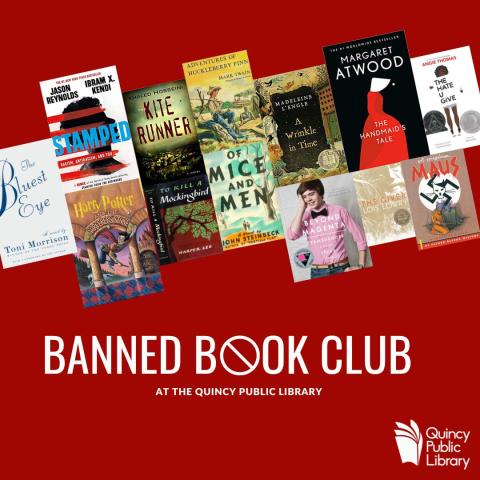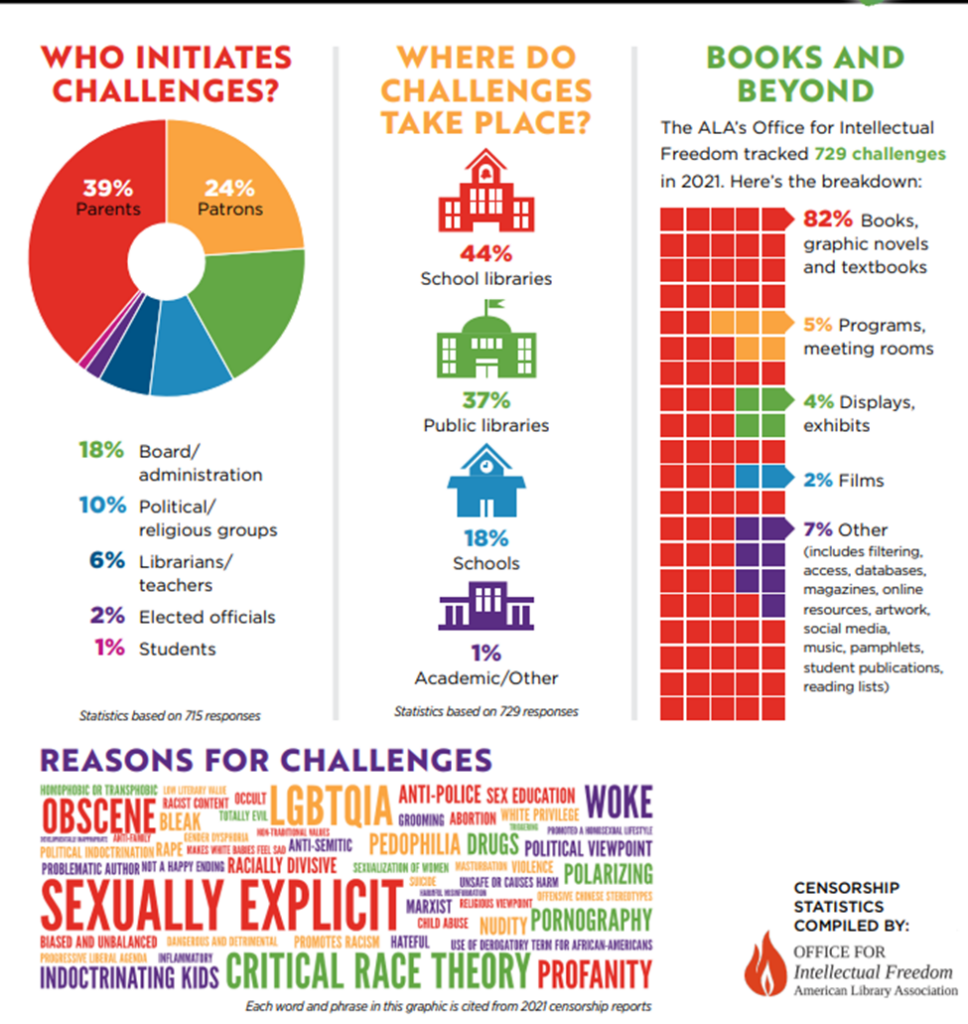Banned Book Club seeks to stand up to censorship

QUINCY — What started as a simple FaceBook post mentioning “Banned Book Week” by Victoria DeMent, communications and development coordinator of the Quincy Public Library, has turned into the latest book club offered by the library.
The Banned Book Club’s first meeting is Thursday, Oct. 27. you can register here. Rachelle Gage, community engagement specialist and adult programming librarian, will lead the group.
“They called me into the office, and they felt I was exactly the person for the job because I had mentioned that I made it my personal goal many years ago to read everything on the banned book list,” Gage said.
Gage has given up on that goal, since more than 11,000 books on the list, but she says there isn’t a lack of interest.
“Well, it’s a big social topic right now,” she said. “You know, you have the people on the side of the fence who, to put it mildly, want to impose their values on everyone else. Then you have the people on the other side of the fence who are ‘no censorship period, ever, under any circumstances.’ Then you have others who just recognize the value of some of these books and can overlook the flaws that they have. Look at the value underneath.”
Picking the book list to read has been a challenge for Gage.
“That was a whopper,” she said. “So basically, I looked at what pops up most often. I took the ones we see most often throughout history, and then I added the ones that we’ve been seeing most often in the last 20 years. The American Library Association has been keeping statistics on the top 10 most challenged books and categorizes them according to the reasons they were challenged. Maybe it contained LGBTQIA+ content or it had graphic sex or profanity or was considered obscene or is against a religious viewpoint. I categorized them according to that (criteria). I ended up with 10 to 12 books in each category for our Banned Book Club to choose from.”
According to the American Library Association, there were more than 725 challenges to library, school, and university materials and services in 2021 — roughly 4.5 times more than 2020. Two institutions are primarily targeted — public and school libraries.
ALA President Lessa Kanani’opua Pelayo-Lozada is concerned with the direction the increase in banned book requests is taking the country.
“Banning books … what that does, we historically know that it silences diverse voices, and that it also silences ideas that individuals need to have access to, to make decisions for themselves on what kinds of lives they live, what kind of world they want to live in,” said Pelayo-Lozada, who holds a master’s degree in library science and information from UCLA.
She adds the majority of the books targeted are written for young adults.
“Most of the books that are being banned are focusing on LGBTQIA+ authors or stories or the histories of … as well as black and indigenous people of color,” she said. “Others are banned for being sexually explicit or engendering a specific social agenda. Some have been challenged for being anti-police, but they’re all kind of under the guise of protecting children.”
Pelayo-Lozada understands parents should monitor what their children should read.
“Families absolutely have the right to guide what their family reads and what is appropriate for their children, but they don’t have that right to guide for other people’s families and other people’s children. It should be up to the family unit to decide what they want to read together. And so, when folks are asking for books to be removed from libraries, they’re taking away access from other families.”
Pelayo-Lozada fears a larger agenda is taking place.
“The next couple of weeks are going to be essential, I think, in this fight against book bans, because there are political candidates who are using this as part of their platform … that they are ‘pro getting these books banned.’ You know, out of student’s hands and making sure that they are living the ideal that a few think that they shouldn’t be living,” she said.
The ALA conducted a bi-partisan poll earlier this year. The results stated that 71 percent of those surveyed opposed banning books from public libraries.
“(This is the) antithesis of the democratic society that we live in … that is supposed to have the free exchange of ideas and information,” Pelayo-Lozada said. That is exactly what we’re seeing right now, the kind of the government control of ideas and silencing of voices that I think as Americans, goes against everything that we stand for.”
Top 10 Most Challenged Books of 2021
The ALA Office for Intellectual Freedom tracked 729 challenges to library, school, and university materials and services in 2021. Of the 1597 books that were targeted, here are the most challenged, along with the reasons cited for censoring the books:
- Gender Queer by Maia Kobabe
Reasons: Banned, challenged, and restricted for LGBTQIA+ content, and because it was considered to have sexually explicit images - Lawn Boy by Jonathan Evison
Reasons: Banned and challenged for LGBTQIA+ content and because it was considered to be sexually explicit - All Boys Aren’t Blue by George M. Johnson
Reasons: Banned and challenged for LGBTQIA+ content, profanity, and because it was considered to be sexually explicit - Out of Darkness by Ashley Hope Perez
Reasons: Banned, challenged, and restricted for depictions of abuse and because it was considered to be sexually explicit - The Hate U Give by Angie Thomas
Reasons: Banned and challenged for profanity, violence, and because it was thought to promote an anti-police message and indoctrination of a social agenda - The Absolutely True Diary of a Part-Time Indian by Sherman Alexie
Reasons: Banned and challenged for profanity, sexual references and use of a derogatory term - Me and Earl and the Dying Girl by Jesse Andrews
Reasons: Banned and challenged because it was considered sexually explicit and degrading to women - The Bluest Eye by Toni Morrison
Reasons: Banned and challenged because it depicts child sexual abuse and was considered sexually explicit - This Book is Gay by Juno Dawson
Reasons: Banned, challenged, relocated, and restricted for providing sexual education and LGBTQIA+ content. - Beyond Magenta by Susan Kuklin
Reasons: Banned and challenged for LGBTQIA+ content and because it was considered to be sexually explicit.

Miss Clipping Out Stories to Save for Later?
Click the Purchase Story button below to order a print of this story. We will print it for you on matte photo paper to keep forever.

